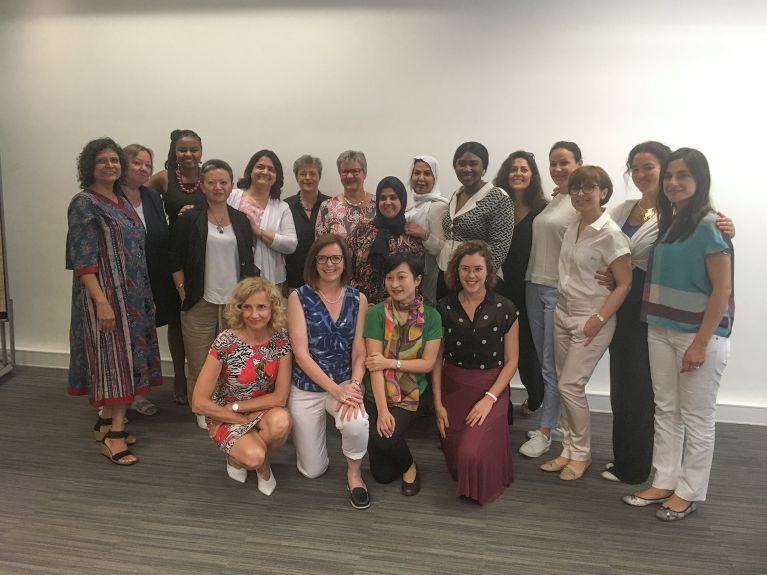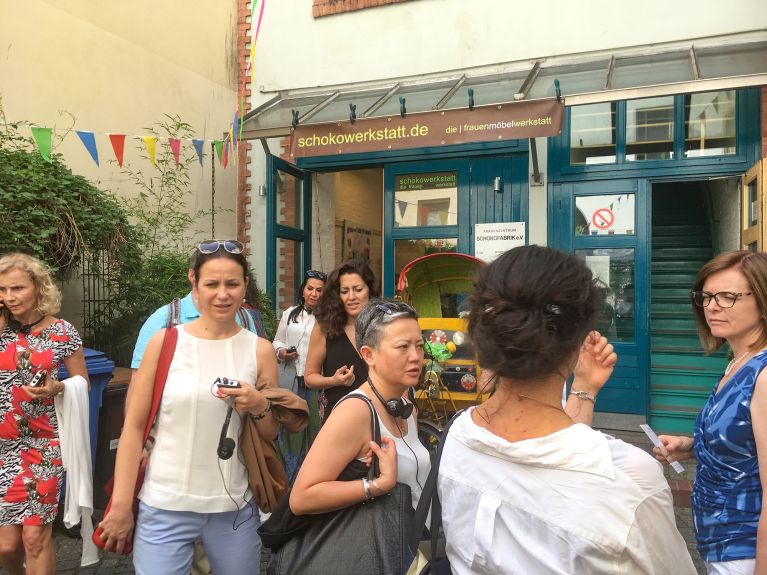Equal rights require legislation
How do you give women better opportunities in the job market? International visitors learn from Germany’s experiences – and from one another.

On a hot summer’s day, 15 female journalists and businesswomen from around the globe, all of them active in various economic associations and initiatives, sit together in a conference hall in Berlin-Mitte. They share their impressions on the topic of equality between men and women and swap experiences. They are all participants in a subject-based trip on “Women in the Economy. Female Founders in Germany” in the context of the Visitor's Programme of the Federal Foreign Office. Two female representatives of the federal association Unternehmerfrauen im Handwerk (UFH, trans. Female Entrepreneurs in the Trades) have just talked about their work. Their goal: to support female family members who work in German trades businesses. “There is no trades training for women in our country, much less support for women in this area,” comments Caroline Gaitho, a young entrepreneur from Kenia, who is active in several associations at the same time, among other things as the chair of the initiative “Alternatives Africa,” which has a focus on supporting young female entrepreneurs.
Whether in Moscow or Gaza: The goal remains the same
The two speakers from UFH go on to ask the group about the situation of women in their countries. Yun-Chan Liao, a journalist from Taiwan, relates that 80 percent of the people working in her company are women. Young Muscovite lawyer Elena Balashova reports that many of her clients from West Europe actually tend to prefer working with women. Nevertheless, she says, the situation of women on the Russian job market remains difficult – especially when it comes to the question of reconciling work and family. A topic that is on the minds of many women and men around the globe – and in Germany, too.
Canadian entrepreneur Laurel Douglas, founder of the non-profit organization “Women’s Enterprise Centre,” which aids female founders and entrepreneurs, has entirely different concerns: “In our country, the topic of gender equality has been such a strong focus for years that I fear a backlash might occur.” Canadians fought long and hard for 12 months of maternity leave, only to then find out that many mothers were returning to work after four months after all. Too much attention to equality is not the problem Majd Almashharawi from Gaza is currently fighting: “When I began building a business five years ago it was almost impossible to survive.” With an unemployment rate of 72 percent, the highest world-wide, the chances for self-employed women in Gaza were next to nothing.
Dieses YouTube-Video kann in einem neuen Tab abgespielt werden
YouTube öffnenThird party content
We use YouTube to embed content that may collect data about your activity. Please review the details and accept the service to see this content.
Open consent formChallenging the gender pay gap
Nevertheless Almashharawi succeeded. Her company Sun Box, which supports start-ups in the field of renewable energies, has become an important local platform for female founders. She is currently organizing the first conference on women as entrepreneurs in Gaza. For her and many other participants it was interesting to see the significance that is by now being placed on gender equality in Germany. It became clear in conversation with the Federal Ministry for Family Affairs, Senior Citizens, Women and Youth (BMFSFJ) however, that much remains to be done in Germany, too.
One important indicator, the “Gender Pay Gap,” meaning the gap between what men and women are paid for doing the same work, is relatively high in Germany at 21 percent as compared to the OECD average – which is currently at 16,1 percent. This was part of the reason why the German government decided to counter this with a new law. Since 2017 companies are obligated to show in more transparent ways how the pay of men and women is calculated. The reason for the pay gap: Women often don’t even know that they are being paid less for the same work.
“Progress through binding laws”
In order to improve the proportion of women active on supervisory boards, the government has further implemented a 30-percent quota. “We have reached this goal,” Fischer explains. Yet the law works less well in those areas in which the quota is not binding. Fischer’s conclusion: As long as there is no obligation at the legislative level, then progress cannot be expected.

“If you really want something, you can make it happen”
At the end of the conference the participants visit Schokowerkstatt, a joinery business entirely managed by women in Berlin. Having started off without a bank credit and merely supported by grants provided by the city, the women made their life-long dream come true here – and in what was once a male domain, into the bargain. “At the time there might have been ten female carpenters in all of Berlin,” remembers Rosi Klein, chairwoman and co-founder of the cooperation Schokofabrik eG.
Concluding the tour, she also has some advice for young female founders: “Don’t think that money is everything.” And: “If you really want something, you can make it happen.”
You would like to receive regular information about Germany?
Subscribe here:



